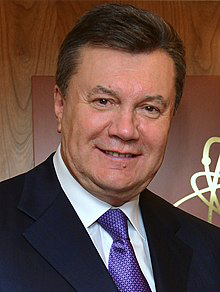

President of Ukraine
Viktor Fedorovych Yanukovych 9 July 1950 4 Yenakiyevo, Stalino Oblast, Ukrainian SSR, Soviet Union4
-
25 February 2010 – 22 February 2014
4th President of Ukraine (2010-14) Not to be confused with his son, Viktor Viktorovych Yanukovych. In this Eastern Slavic naming convention, the patronymic is Fedorovych and the family name is Yanukovych. Viktor Fedorovych Yanukovych (Ukrainian: Ві́ктор Фе́дорович Януко́вич , pronounced ( listen ) ; Russian: Виктор Федорович Янукович ; born 9 July 1950) is a Ukrainian politician who served as the fourth President of Ukraine from 2010 until he was removed from office in the 2014 Ukrainian Revolution. From 2006 to 2007 he was the prime minister of Ukraine. After rejecting the Ukrainian-European Association Agreement, Yanukovych was ousted from office in the 2014 Ukrainian Revolution. He currently lives in exile in Russia. Yanukovych served as the governor of Donetsk Oblast, a province in eastern Ukraine, from 1997 to 2002. He was Prime Minister of Ukraine from 21 November 2002 to 7 December 2004 and from 28 December 2004 to 5 January 2005, under President Leonid Kuchma. Yanukovych first ran for president in 2004: he advanced to the runoff election and was initially declared the winner against former Prime Minister Viktor Yushchenko. However, the election was fraught with allegations of electoral fraud and voter intimidation. This caused widespread citizen protests and Kyiv's Independence Square was occupied in what became known as the Orange Revolution. The Ukrainian Supreme Court nullified the runoff election and ordered a second runoff. Yanukovych lost this second election to Yushchenko. He served as Prime Minister for a second time from 4 August 2006 to 18 December 2007, under President Yushchenko. Yanukovych was elected President in 2010, defeating Prime Minister Yulia Tymoshenko. The election was judged free and fair by international observers. November 2013 saw the beginning of a series of events that led to his ousting as president. Yanukovych rejected a pending EU association agreement, choosing instead to pursue a Russian loan bailout and closer ties with Russia. This led to protests and the occupation of Kyiv's Independence Square, a series of events dubbed the "Euromaidan" by proponents of aligning Ukraine toward the European Union. In January 2014, this developed into deadly clashes in Independence Square and in other areas across Ukraine, as Ukrainian citizens confronted the Berkut and other special police units. In February 2014, Ukraine appeared to be on the brink of civil war, as violent clashes between protesters and special police forces led to many deaths and injuries. On 21 February 2014, Yanukovych claimed that, after lengthy discussions, he had reached an agreement with the opposition. Later that day, however, he left the capital for Kharkiv, saying his car was shot at as he left Kyiv, and travelling next to Crimea, and eventually to exile in southern Russia. On 22 February 2014, the Ukrainian parliament voted to remove him from his post. Parliament set 25 May as the date for the special election to select his replacement, and, two days later, issued a warrant for his arrest, accusing him of "mass killing of civilians." After his departure, Yanukovych conducted several press conferences. In one of these, he declared himself to remain "the legitimate head of the Ukrainian state elected in a free vote by Ukrainian citizens". On 18 June 2015, Yanukovych was officially deprived of the title of President of Ukraine by the Verkhovna Rada of Ukraine. On 24 January 2019, he was sentenced in absentia to thirteen years' imprisonment for high treason by a Ukrainian court.

We use cookies
We use cookies and other tracking technologies to improve your browsing experience on our website, to show you personalized content and targeted ads, to analyze our website traffic, and to understand where our visitors are coming from. Privacy Policy.